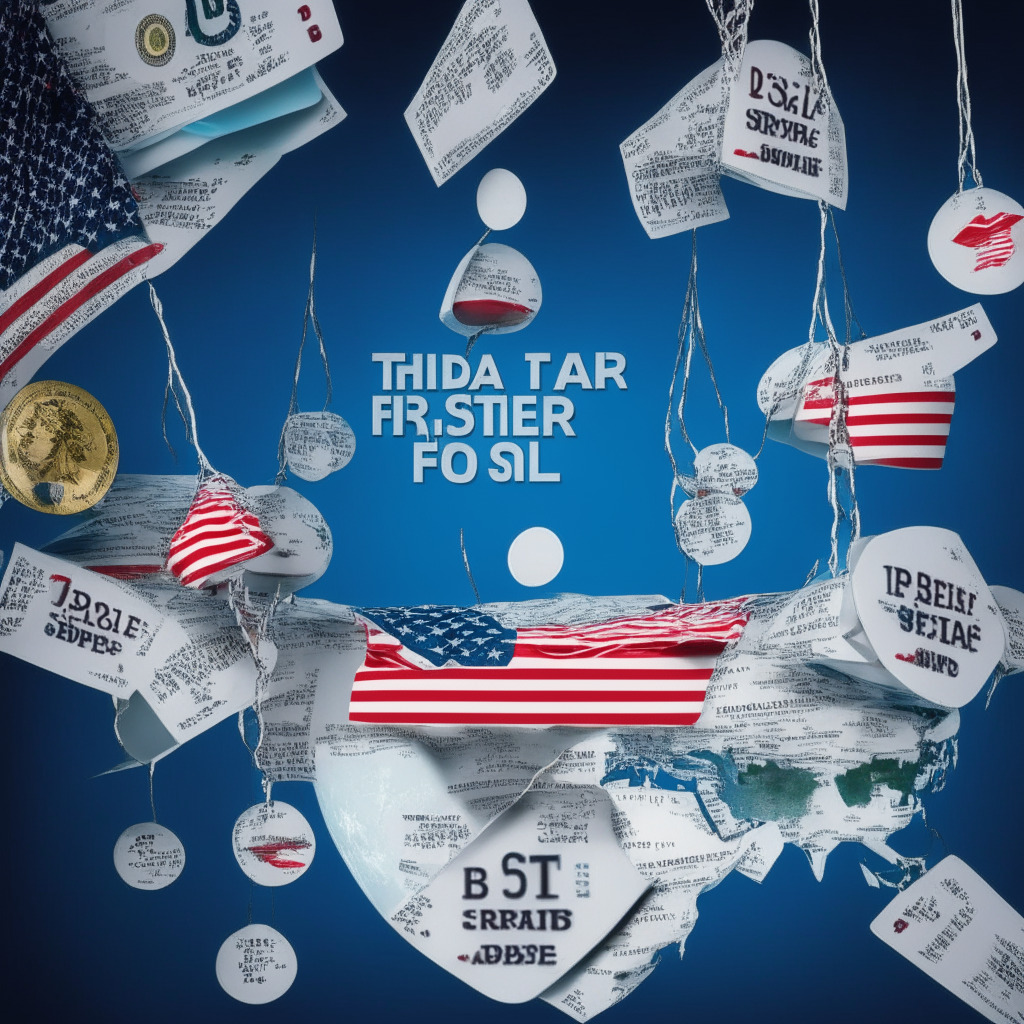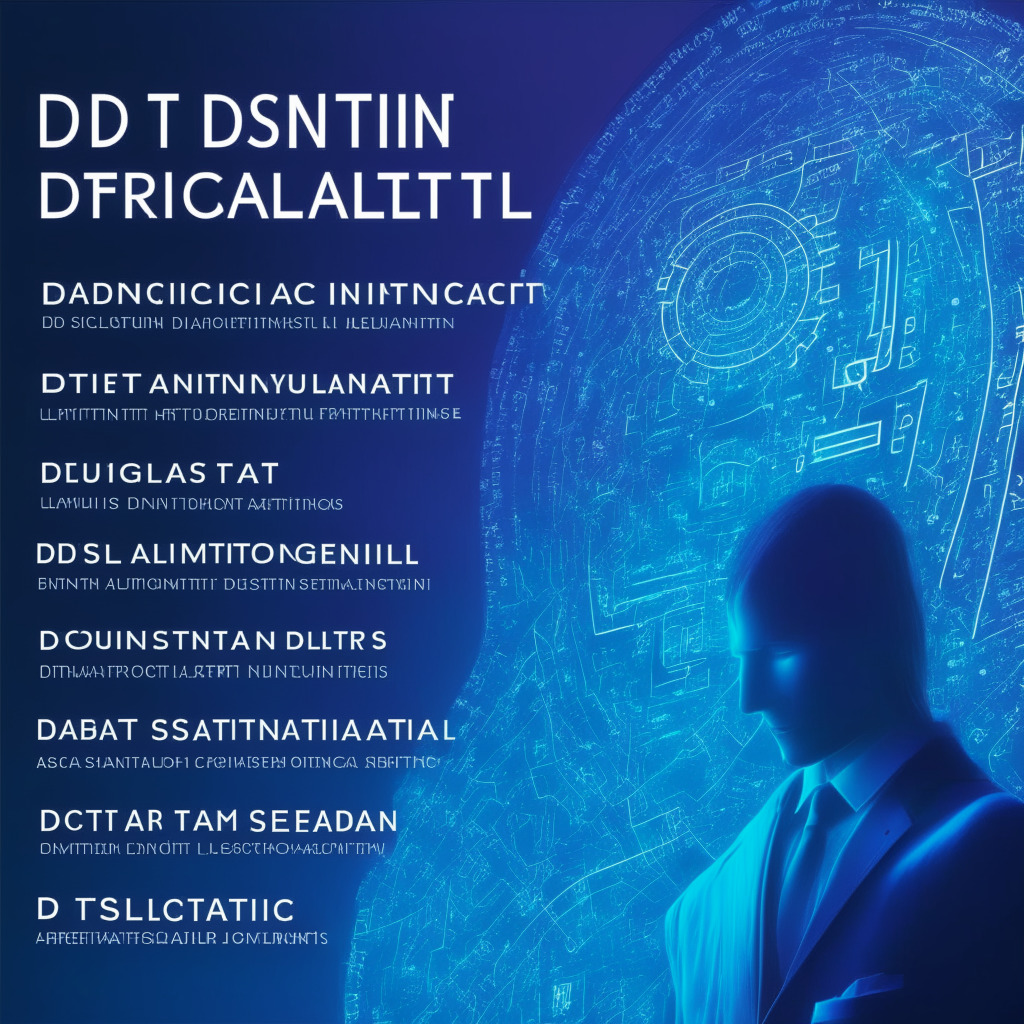Tether reduced counterparty risk by withdrawing $4.5 billion from banks, reinforcing its USDT stablecoin, while Ripple scored a victory against the SEC in their legal dispute. Simultaneously, security concerns arise as Ledger launches its recovery service for lost seed phrases.
Search Results for: us treasury
Ledger Wallet Recovery Debates & Exciting Developments: A Busy Week for Crypto Enthusiasts
This week in crypto, Ledger introduced a wallet recovery service, ETH staking demand soared, Tether invested in Bitcoin, and Samsung partnered with the Bank of Korea for CBDC research. Additionally, Ripple acquired Metaco, and a Uniswap survey highlighted the need for DeFi simplification.
US Debt Ceiling Crisis: Implications for Crypto Market and Broader Economy
The U.S. debt ceiling crisis raises concerns about the stability of the dollar and the future of fiat currencies, potentially presenting an opportunity for the crypto market. Digital currencies like Bitcoin and Ethereum may serve as hedges against traditional financial markets and economic instability, while decentralized finance platforms could see increased activity.
Crypto Market Cautious Ahead of Powell Speech: Impact on Bitcoin and Investor Sentiment
As the crypto market remains cautious, Bitcoin hovers below $27,000 amidst hawkish comments from central bank officials and anticipation of Jerome Powell’s upcoming speech. The market’s risk-averse sentiment may be influenced by Powell’s possible hawkish address.
Paraspace NFT Drama: Unraveling Trust, Accountability, and Crypto Mismanagement
The Paraspace NFT protocol saga, involving the resignation of co-founder Jay Yao amid accusations of mismanagement of 2,909 Ether ($5.4 million), highlights potential pitfalls in cryptocurrency management and raises questions about trust and accountability within the blockchain community.
Debt Ceiling Increase: How Bitcoin Could Face Losses Amid Rising Treasury Liquidity
Bitcoin could face losses in Q3 2023 due to the expected agreement on raising the U.S. debt ceiling, which might increase Treasury’s liquidity and impact risk asset markets, including cryptocurrencies. Bitcoin may struggle to reclaim yearly highs, with prices likely ranging between $20,000-$30,000 unless a new narrative or significant catalyst emerges.
Stablecoin Dilemma: Market Contraction Threatens Crypto Recovery and US Debt Ceiling Issue
The stablecoin universe’s ongoing contraction, impacted by U.S. regulatory crackdowns and other challenges, hinders hopes of a sustained crypto market recovery, says a JPMorgan research report. Stablecoins’ struggles pose far-reaching consequences for the entire crypto ecosystem, and overcoming these obstacles is crucial for long-term growth and security.
Stable Bitcoin Amid US Debt Crisis: Tether Influence and USD’s Impact on Crypto Market
Bitcoin experiences a modest 1.5% gain as market sentiment gets a boost following President Biden’s confidence in resolving the US debt crisis. Tether’s commitment to purchasing Bitcoin may contribute to recovery, but the strengthening greenback and bearish outlook may provide hurdles.
UK Treasury’s Gambling-Style Crypto Regulation Faces Backlash: Striking a Balance for Growth
The Treasury Committee’s proposal to regulate unbacked cryptocurrencies like gambling has faced backlash from CryptoUK and Kraken UK. Critics argue that this approach overlooks sector nuances and hinders growth, while urging for a bespoke regulatory model for the UK’s cryptocurrency framework.
US Debt Default and Stablecoins: How Circle Aims to Protect USDC Reserves with Repo Agreements
Circle Internet Financial is adjusting the reserves behind the $30 billion USD Coin, considering the possibility of a U.S. government debt default. BlackRock manages the Circle Reserve Fund, now incorporating $8.7 billion in overnight repo agreements as extra protection for the USDC reserve.
Stablecoin Regulation: Balancing Innovation and Consumer Protection in the US Market
California Rep. Maxine Waters has introduced a draft bill to regulate stablecoins in the United States, focusing on payment stablecoin issuers’ requirements, digital dollar research, and related subjects. Supporters say a clear regulatory framework would ensure oversight and consumer protection, while critics argue it could hinder innovation and limit the broader adoption of cryptocurrencies.
UK Treating Crypto as Gambling: The Impact on Retail Investing and Industry Growth
A UK regulatory panel suggests treating retail investing in unbacked cryptocurrencies like Bitcoin as gambling due to volatility and lack of intrinsic value. This approach could result in heavier taxes and compliance with gambling regulations, possibly hindering innovation and industry growth.
UK Lawmakers Push for Crypto Trading as Gambling: Regulations and Implications Explored
The UK Treasury Committee recommends regulating retail trading of unbacked crypto assets like Bitcoin and Ether as gambling due to their price volatility and lack of intrinsic value, potentially posing significant risks to consumers. The committee acknowledges potential benefits of cryptocurrencies in financial services and markets and supports developing a regulatory framework to mitigate risks.
US Debt Default Fears, Ethereum Staking Redemptions, and Crypto Regulation Uncertainty
The cryptocurrency market faces a downturn amidst growing concerns over the US potentially defaulting on debt and regulatory uncertainty in the sector. Alongside these factors, massive Ethereum staking redemptions and a correlation with the volatile US stock market have impacted the market.
Cryptocurrency Outflows Hit $200M: Are Investors Shifting Focus from Bitcoin to Altcoins?
The latest “Digital Asset Fund Flows Report” by CoinShares shows digital asset investment products facing another week of outflows, totaling $54 million. Investors shift from Bitcoin towards alternative coins, exploring diverse altcoin investments and potentially changing market dynamics in the long term.
Rising 10-Year Treasury Yield vs DeFi Yields: The Battle for Investor Confidence
The rising 10-year yield on US Treasury bills surpassed yields offered by DeFi protocols, impacting the competitive edge of DeFi investments. Some Ethereum-based liquid staking providers outperform US-backed bonds; however, crypto yields can be volatile, and risks like market fluctuations must be considered.
Bitcoin’s Rising Status as Safe Haven Asset Amid US Debt Ceiling Crisis
A recent Bloomberg Markets Live Pulse survey suggests Bitcoin could be considered a safe haven asset, surpassing traditional options like the yen, franc, or U.S. dollar, amid concerns over the U.S. debt ceiling. The survey highlights a growing interest in digital currencies as an alternative means of asset protection, showcasing their potential in the financial future.
US Debt Crisis Looming: Implications, Pros & Cons for Crypto Market and Bitcoin
The U.S. government faces a “significant risk” of not meeting its financial obligations by June due to a $31.4 trillion debt limit, potentially impacting the crypto market as investors seek alternative assets like Bitcoin. However, concerns about market volatility and regulation may deter some investors.
US Losing Stablecoin Dominance: USDC’s Struggle and the Rise of Tether Threatens Digital Economy
The US may be losing ground in the digital economy as USD Coin (USDC) faces strong competition from Tether (USDT). This shift could undermine US control and expose the Web3 community to less-regulated forces. Policymakers must prioritize Web3 and stablecoins to ensure America’s influence in the digital economy.
Soaring Profits for Tether: Stablecoin Industry Boom and USDT Token Holder Concerns
Tether reported a record profit of $1.48 billion in Q1 2021, attributed to rising interest rates and diversifying its reserves with physical gold and Bitcoin. The stablecoin issuer sees a 20% increase in token circulation, reflecting growing customer trust. However, concerns arise as USDT token holders receive no interest, and companies need to balance profits and customer interests for sustainable growth.
2023 Crypto Crackdown: Operation Choke Point 2.0 vs Banking Industry Collapse
The US regulators’ crackdown on the crypto market has led to the closure of Silvergate, Silicon Valley Bank, and Signature, while prominent figures criticize scapegoating cryptocurrencies for the banking crisis. The House Financial Services Committee investigates potential coordinated efforts to de-bank the crypto market as the banking crisis worsens.
Stablecoin Issuers Adapt Strategies Amid US Debt Ceiling Crisis: Different Approaches Compared
Stablecoin issuer Circle has revised its reserve treasury strategy to mitigate potential risks from a US debt default, converting to short-dated U.S. Treasuries. As stakeholders in the blockchain industry adjust strategies, Circle aims to insulate itself from risks associated with a possible U.S. debt crisis.
IRS Hits FTX With $44 Billion Claims: Trust in Crypto Exchanges Under Fire
The United States Department of Treasury and IRS filed 45 claims amounting to $44 billion against cryptocurrency exchange FTX and its subsidiaries, related to tax liabilities for FTX’s sister company Alameda Research LLC. The recent events question trust in cryptocurrency exchanges, and highlight the importance of understanding the regulatory environment and tax implications for such platforms.
Tether’s $1.48B Q1 Profit: Can Success Amid Transparency Concerns Sustain?
Tether reported a $1.48 billion net profit in Q1 2021 and disclosed its $1.5 billion Bitcoin and $3.4 billion gold holdings. Despite scrutiny, Tether’s USDT stablecoin remains a market leader. Increased transparency efforts include reducing secured loans in reserves and providing clearer information on reserve assets.
Tether’s Soaring Reserves: Sign of Trust or Reminder of Controversies?
Tether Holding Limited reported a significant increase in reserves, reaching an all-time high of $2.44 billion in Q1 2023. Despite past controversies surrounding transparency, Tether has enhanced efforts to provide regular attestations and maintain stability, emphasizing the importance of thorough market research before investing in cryptocurrencies.
Abu Dhabi Royal Family’s Big Short: How It Affects Cryptocurrency and US Market Debate
The Royal Group, managed by Abu Dhabi’s royal family, has shifted its investment stance, moving from US equities to short-term US Treasury bonds, commodities, and cryptocurrency amidst recession concerns. This highlights the potential opportunities cryptocurrencies present as a hedge against traditional market downturns and as a diversification tool in investment portfolios.
Aragon Retools DAO After 51% Attack: Debating Treasury Security Vs. Decentralized Governance
Switzerland-based Aragon Association recently pulled plans for voting rights over its future direction due to a 51% attack on its Aragon DAO. The attackers, called “Risk Free Value (RFV) Raiders,” aimed to manipulate the use of Aragon’s ANT token for financial gain. In response, Aragon repurposed its DAO as a new grants program to secure its treasury and mission.
Crypto Market Awaits US Inflation Report: Impact on Bitcoin and Wall Street’s Next Move
As the U.S. inflation report release approaches, investors anticipate its impact on the crypto market. The focus lies on Binance and cold wallet storage while observing the U.S. Federal Reserve’s decisions and their effects on cryptocurrencies. Cautious optimism remains among blockchain enthusiasts.
Bittrex Bankruptcy: A Lesson in Crypto Evolution, Self-Custody & Regulatory Uncertainty
Bittrex, a once-popular crypto exchange platform, files for bankruptcy protection due to an untenable regulatory and economic environment in the US. The rise of decentralized finance (DeFi) and platforms like Uniswap have contributed to its decline, while regulatory uncertainty looms over the crypto industry.
Biden’s Blockchain Focus: Digital Identity, DLT Advancements, and Balancing Privacy
The US government has emphasized the development of critical and emerging technologies, including digital identity infrastructure and distributed ledger technologies (DLT). As blockchain gains significance in the economic landscape, challenges arise in balancing innovation and privacy, while aiming to bolster US competitiveness and maintain a secure digital environment.
The Trillion-Dollar Platinum Coin Debate: Ingenious Solution or Financial Sleight of Hand?
A potential solution to the U.S. debt default in June involves creating a $1 trillion platinum coin, exploiting a legal loophole that allows the Treasury to mint platinum coins of any value. Proponents of Modern Monetary Theory (MMT) find the idea viable, while others view it as a financial sleight of hand.
Freezing SpartacusDAO’s Crypto Assets: Legal Battle Exposes Regulatory Struggles in a Digital World
A federal judge maintains a freeze on $35 million in crypto assets belonging to SpartacusDAO, facing a lawsuit from unhappy investors. This decision highlights the struggle in regulating the crypto industry amidst digital innovation and raises questions on safety, compliance, and governance in the rapidly evolving crypto market.































